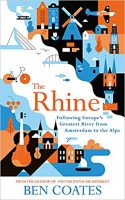The Rhine: Following Europe’s Greatest River from Amsterdam to the Alps
by Ben Coates
Nicholas Brealey (£12.99)
 Given that the author was travelling from mouth to source, I could hardly expect to be going with the flow, but I was still hoping to be swept along. That, unfortunately, wasn’t my experience on reading The Rhine. I found myself bumping into rocks and getting tangled up in weed. It isn’t a bad book, but it’s a sloppily edited one.
Given that the author was travelling from mouth to source, I could hardly expect to be going with the flow, but I was still hoping to be swept along. That, unfortunately, wasn’t my experience on reading The Rhine. I found myself bumping into rocks and getting tangled up in weed. It isn’t a bad book, but it’s a sloppily edited one.
Coates, who has earned a living doing everything from corporate speech-writing to aid work, was born in England in 1982, moved to the Netherlands in 2010, married a Dutchwoman and now lives in Gouda. But he was resident initially in Rotterdam, where the locals persuaded him during his second winter to have a go at ice skating on the River Rotte. It took him farther than he expected. Having learnt subsequently that the Rotte was a tributary of the Maas, which forms much of the lower reaches of the Rhine, he realised he could follow the water halfway across a continent, to its source in Lake Toma in Switzerland.
This is his second book. His first, Why The Dutch Are Different, was a useful primer on his adopted country, and one I have recommended to Telegraph readers. I was looking forward to seeing him range farther afield. His intention, he declared, was “to learn more about how the Rhine had shaped — and continued to shape — the countries it flowed through, and the people who lived there”. He also wanted to explore how the region was changing, the role of the Rhine in a world where many leaders “were more inclined to build walls than bridges”; and to find out whether there was such a thing as a “Rhine culture” uniting the Dutch, Swiss and Germans.
He follows the river by bike, boat, train and on foot. He is denied the accidents that travel writers secretly hope for and relish in the retelling, and beyond Holland his conversations with locals rarely go beyond pleasantries, so he is essentially a tourist, albeit a well-read one.
His portraits of places along the way combine his own observations with diligent research. He conveys well the role of the Rhine in European culture and history; how it has been seen at different times as a “free-flowing conduit for goods, people and ideas” and as a frontier. In the age of the internet, it’s a riposte to “those who thought riverine trade had gone the way of the fax and the dodo”.
If his jokes can be lame, he has an eye for oddity. He reveals, for example, that Dutch herring companies used to employ a woman to lick fish scales from the eyeballs of her colleagues; and that the rhinestone (an adornment I’d never associated with the river) was an invention of a Frenchman, Georg Friedrich Strass, working in Strasbourg, who made quartz-like crystals shine more brightly by mixing them with reflective foil.
Looking back on his trip, and the mixture of nationalities he has encountered even in small towns — from Polish boatmen to Australian tourists — he ponders whether the river might engender a reliance on trade that “made people more business-minded and open to the world”. But he also notes that some of the places that had done best from such trade were now “fertile hunting grounds for the nationalist, isolationist right”.
By the time I reached these reflections, I was weary — not from reading but from DIY editing. I read the first 30 pages-or-so of the book in proof form, switching to a final version as soon as one arrived. I told myself that the misspellings, transpositions and omissions of the proof were a blemish that would be confined to what was probably a late-finished section and that they would have been corrected. They haven’t been.
Nor has the author been saved from his fondness for redundant modifiers (“utterly ravaged”) and repetition: “Vlaardingen was… a once prosperous place. Vlaardingen was a genuinely lovely place, but it also had… a surfeit of cheap takeaway places.” A writer might miss these unintentional echoes on a first read, but I’d expect him to pick them up later. If he doesn’t, the staff at his publisher certainly should. Ditto with the phrase “literally jaw-dropping”, which is used of scenery twice.
I was looking forward to reading The Rhine. I didn’t expect to be editing it. MK
This review appeared in The Daily Telegraph on November 24, 2018
